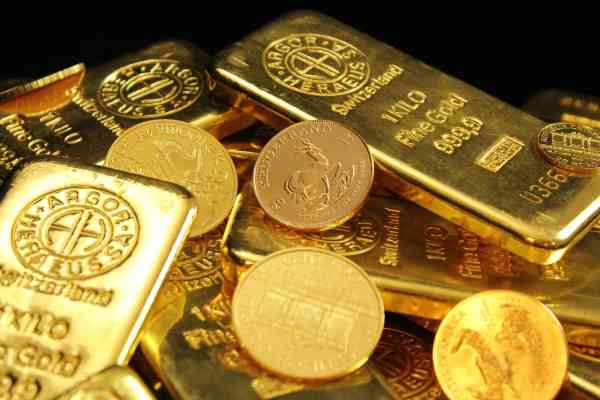March 20th, 2025 | 07:45 CET
Commerzbank, Desert Gold, Strategy – A EUR 900 billion debt avalanche – Which stock best protects against inflation?
Germany is at a crossroads: With a planned debt surge of EUR 900 billion for infrastructure and defense, inflation, rising interest rates, and a possible loss of the top credit rating are looming. In this uncertain environment, investors seek protection – but where are the opportunities? Commerzbank offers traditional banking with interest, while Desert Gold is profiting from the precious metals boom. And then there is Strategy (formerly MicroStrategy), which aims to protect investors' money from devaluation with Bitcoin as "digital gold" while also profiting from increases in the cryptocurrency price. Three companies, three strategies: Which protects the portfolio better from the debt avalanche, and which stock has potential? An analysis between security, precious metals, and crypto risk.
time to read: 5 minutes
|
Author:
Armin Schulz
ISIN:
COMMERZBANK AG | DE000CBK1001 , DESERT GOLD VENTURES | CA25039N4084 , MICROSTRATEG.A NEW DL-001 | US5949724083
Table of contents:

"[...] One focus will be on deposits near the surface. These would be good arguments for a quick production decision using the low-cost heap leaching method. [...]" Brodie Sutherland, CEO, Tocvan Ventures
Author
Armin Schulz
Born in Mönchengladbach, he studied business administration in the Netherlands. In the course of his studies he came into contact with the stock exchange for the first time. He has more than 25 years of experience in stock market business.
Tag cloud
Shares cloud
Commerzbank – Ambitious goals
Commerzbank clearly outperformed the industry index EUFN last year with a total return of 107%. Drivers were a robust commission business with a plus of 7% and a stable net interest income of EUR 8.3 billion despite the ECB's key interest rate cuts. Operating profit rose 12% to EUR 3.8 billion, supported by cost discipline with a cost-income ratio of 59% and lower loan loss provisions. With a return on equity (RoTE) of 9.2%, the bank exceeded its targets and distributed EUR 1.73 billion to shareholders – including an increased dividend of EUR 0.65 and extensive share buybacks.
Commerzbank is targeting a RoTE of 15% by 2028 – almost double the figure for 2024. Drastic cost reductions are planned, including 3,900 job cuts and a planned cost-income ratio of 50%, as well as a reduction in the CET1 ratio to 13.6%. In addition, net commission income is expected to grow by 7% annually, supported by digitalization and expansion in asset management. The dependency on the economy remains critical. While savings and capital optimization account for around 40% of the RoTE jump, the rest depends on the bank's competitive success against rivals such as ING, which are pursuing similar goals.
Currently, Commerzbank is trading at a price-to-earnings ratio of around 10, which is slightly below its European peers, which are trading at around 11.2. However, the valuation already reflects a large part of the optimization successes. Risks such as a recession or more aggressive ECB interest rate cuts below 2% could weigh on the interest margin. Strategic partnerships such as the recent one with Visa and a possible increase in UniCredit's stake offer long-term potential. In the short term, however, uncertainties prevail, especially since the Fed announced its interest rate decision yesterday evening. The share price has risen by around 60% in 2025 and is currently trading at EUR 24.50.
Desert Gold - Gold Explorer with Ambitions in West Africa
Desert Gold is establishing itself as a dynamic player in the gold sector with a focus on Mali, a centerpiece of the West African gold belt. The Company controls 440 sq km in the highly productive Senegal-Mali region, surrounded by industry giants such as Barrick Gold and Endeavour Mining. Over 23 gold zones have been identified on the property to date. With approximately 1.1 million ounces of measured and indicated resources and advanced development of oxide deposits, Desert Gold signals scalable potential. An experienced team, including geological experts such as Don Dudek, is driving exploration forward.
Current drilling and newly evaluated historical data from the Mogoyafara South and Linnguekoto West projects are yielding promising results. Highlights include 33 meters with 1.58 g/t gold in drill hole RCSP 1316 at the Mogoyafara Zone and drill hole LN011 with 3.4 g/t gold over 12 meters south of Linnguekoto, which opens up a new exploration corridor. CEO Jared Scharf is confident that the SMSZ project still offers significant exploration potential. At the same time, the Company is finalizing an updated PEA for oxide deposits at Barani East, which is expected to be completed by the end of March. In addition, 30,000 meters of drilling are planned in 2025 to expand existing gold zones and increase resources.
Desert Gold aims to increase its resource base from the current 1.1 million ounces to over 2 million ounces through targeted exploration. The high level of M&A activity in the region – driven by major gold producers – underscores the Company's takeover potential once critical resource thresholds are reached. Management, supported by investors like Ross Beaty, is pursuing strategic partnerships and technological precision. For investors, Desert Gold offers an opportunity to gain exposure to one of the most productive gold regions in the world – with a clear roadmap for resource growth and a strong position in the highly competitive exploration market. The stock is currently trading at CAD 0.06.
Strategy - A lever on Bitcoin with risks
Strategy, formerly MicroStrategy (MSTR), has changed radically since 2020. Instead of business intelligence, Bitcoin (BTC) now dominates the balance sheet. With around 499,000 BTCs worth around USD 41.8 billion, the Company is the largest institutional holder of the cryptocurrency. But the share price is closely linked to Bitcoin – and both are currently suffering from massive corrections. Despite a book profit of approximately USD 8.7 billion on its BTC holdings, MSTR is trading at a premium of around 80% to Bitcoin's value. The risk is that if BTC continues to fall, the share price could drop disproportionately.
To buy Bitcoin, Strategy relies on a mix of equity offerings and convertible bonds. Since 2021, the Company has raised over USD 21 billion via equity and USD 9 billion via convertible bonds. If Bitcoin rises, shareholders benefit disproportionately. However, if prices fall, there is a risk of a downward spiral due to share dilution or forced selling. Recently, Strategy announced the issuance of preferred shares with an 8% dividend – an expensive way to continue buying BTC while the core business generates little cash flow.
For investors, the question is: Why not just buy Bitcoin or an ETF like IBIT? MSTR offers leverage, but the risk is high. If BTC crashes, the Company would have to inject capital – presumably by selling more shares. While inclusion in the S&P 500 could support the share price in the short term, long-term performance ultimately depends on Bitcoin's performance. Therefore, the conclusion at present is that those who believe in BTC should instead invest directly in BTC. Strategy remains a speculative asset – with upside potential, but existential risks on the downside. The stock is currently trading at USD 293.02.
In view of the looming inflation risks from Germany's debt avalanche, the three companies offer different protection strategies. Commerzbank relies on traditional stability through interest rate business and cost discipline but remains vulnerable to economic downturns and interest rate cuts. As a gold explorer in West Africa, Desert Gold is benefiting from the precious metals boom, combined with scalable resources and takeover potential – a classic inflation hedge. Strategy acts as a high-risk Bitcoin lever that gains disproportionately when crypto prices rise but poses an existential threat in the event of a crash. While Desert Gold shines as a safer hedge, Strategy remains a speculative bet on digital assets.
Conflict of interest
Pursuant to §85 of the German Securities Trading Act (WpHG), we point out that Apaton Finance GmbH as well as partners, authors or employees of Apaton Finance GmbH (hereinafter referred to as "Relevant Persons") may hold shares or other financial instruments of the aforementioned companies in the future or may bet on rising or falling prices and thus a conflict of interest may arise in the future. The Relevant Persons reserve the right to buy or sell shares or other financial instruments of the Company at any time (hereinafter each a "Transaction"). Transactions may, under certain circumstances, influence the respective price of the shares or other financial instruments of the Company.
In addition, Apaton Finance GmbH is active in the context of the preparation and publication of the reporting in paid contractual relationships.
For this reason, there is a concrete conflict of interest.
The above information on existing conflicts of interest applies to all types and forms of publication used by Apaton Finance GmbH for publications on companies.
Risk notice
Apaton Finance GmbH offers editors, agencies and companies the opportunity to publish commentaries, interviews, summaries, news and the like on news.financial. These contents are exclusively for the information of the readers and do not represent any call to action or recommendations, neither explicitly nor implicitly they are to be understood as an assurance of possible price developments. The contents do not replace individual expert investment advice and do not constitute an offer to sell the discussed share(s) or other financial instruments, nor an invitation to buy or sell such.
The content is expressly not a financial analysis, but a journalistic or advertising text. Readers or users who make investment decisions or carry out transactions on the basis of the information provided here do so entirely at their own risk. No contractual relationship is established between Apaton Finance GmbH and its readers or the users of its offers, as our information only refers to the company and not to the investment decision of the reader or user.
The acquisition of financial instruments involves high risks, which can lead to the total loss of the invested capital. The information published by Apaton Finance GmbH and its authors is based on careful research. Nevertheless, no liability is assumed for financial losses or a content-related guarantee for the topicality, correctness, appropriateness and completeness of the content provided here. Please also note our Terms of use.




